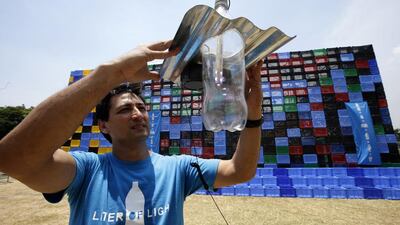PARIS // A year after winning the Zayed Future Energy Prize a UAE resident's project to take light to poor communities and the victims of natural disasters is going from strength to strength.
Illac Diaz’s solar-powered Litre of Light won US$1.5 million (Dh5.51m) in funding. He has spent only a quarter of the funds, but the project has provided 100,000 people with light, double the number first envisaged.
In his booth at the Cop21 Solutions segment in the Grand Palais in Paris, Mr Diaz has spent the past few days teaching 100 students the idea behind his project.
“Working with these students, we are building solar-powered lights. They don’t need it living here but they understand how the project works,” he said.
The lights will be sent to illuminate streets in rural towns in Senegal.
But the power of the project, he said, was in its scalability.
“With less than $300,000 of the money we were granted, we have doubled our presence, providing light to more than 100,000 people affected by lightouts,” he said.
Litre of Light and the United Nations found that during times of disaster, crime more than doubles and one effective deterrent, as many home security systems indicate, is light.
“We have reduced crime significantly, and we are giving people whose lives are completely changed by disasters a livelihood,” said the Filipino. “But I need to add that the scalability driven by the funds from the Zayed Future Energy Prize, is allowing us to have an impact on climate change.”
Using the prizemoney in the run-up to Cop21, Mr Diaz and his team went to 10 villages in Africa, Asia and South America to spread their work and prove its effectiveness.
They taught those in need how to use solar panels and common materials, such as bamboo or plastic, to create light sources.
Lighting with something sustainable and cost effective, Mr Diaz said, improved lives so dramatically that a return to normal life was faster.
A study done with the UNDP showed that almost 70 per cent of the money spent on disaster relief is wasted on logistics and this is the main reason behind Mr Diaz’s policy of “teaching people how to fish”.
“There is a genius in the world’s poor. Why are we not teaching people how to solve their problems and make lives for themselves?” he said. “And in the world of climate change why are we not tapping one of the largest resources we have – the poor?”
He said that the view of developing countries as helpless and in need of assistance was a poison because donor countries begin viewing the needy as burdens. He refused to adhere to that mindset.
“It is projects like mine and so many others that show the developing world is helping [fight] climate change in practical ways, with simple yet effective ideas,” he said. “Change sometimes is that simple.”
The team behind Litre of Light are expected to start helping Yemeni camps later this month.
nalwasmi@thenational.ae

